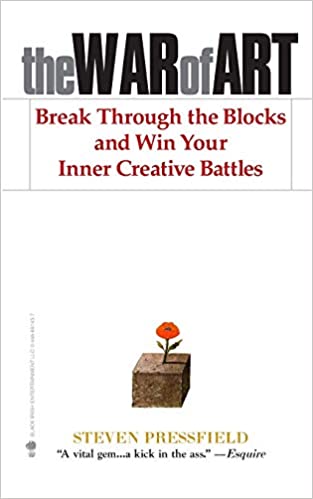Contrary to popular belief, creativity isn’t something that people are born with. It’s something that is honed, developed, and improved on. Want a few simple tricks to help you? You’ve come to the right place.

The War of Art
by Steven Pressfield
⏱ 15 minutes reading time
🎧 Audio version available
Do Nothing
In a world that’s full of schedules so packed you don’t have time for hobbies, think about all the ideas you had as a child. These were the times when creativity seemed to just flow naturally. Back then, you didn’t worry about being creative enough, or if you were doing it right, and there was no pressure to produce anything. We want to recreate these times.
We could tell you to meditate, to break out a yoga mat every day at dawn and wait for inspiration to shine down upon you, but as Alan Cohen once put it, “There is virtue in work and there is virtue in rest. Use both and overlook neither.”
Any creative person could tell you their most creative, outlandish ideas came when they were off-guard, when they were doing something else. Sometimes, you’re so focused on being creative that your brain refuses to obey. So what to do when that happens?
Hear us out. Your brain needs to essentially unplug, to disconnect from all the processing you’re putting it through, from the gigabytes of information you’re constantly exposing it to, and from pressure.
Take “doing nothing” literally. That means not just taking a break from work. That means taking a break from everything, including your phone, social media, TV, books, and anything else that gives your mind onslaughts of information to process.
Now, relax. The art of doing nothing can often be rewarding. It’s essential for your creativity reserves. If you feel like you should be doing something instead, that this is just a waste of time, think about this: you’re technically not doing nothing. As you physically rest, your mind is still working, generating– probably something genius.
Dance Like No One’s Watching
Want another super easy activity that is both fun and boosts creativity like no other? Dance the night away– whether that’s in the privacy of your home or in a packed nightclub, just focus on experiencing this unique art form.
Music and lyrics have this magical way about them. Dancing? It’s a way people express themselves. It helps them experience the world, understand one another; it allows them to experience, communicate, and think without any pressure.
Don’t knock it ‘till you try it. Dancing is also a scientifically proven way of learning. It engaged your communication skills, problems solving abilities, and critical thinking. A study was once conducted to study the effect of dancing, of how it could affect divergent thinking. They had the subject perform improvised dance exercises and the results showed that they actually performed better at whatever creative task they were given!
And these are just the benefits of dancing! What about music? Music is moving, and it’s available at all times through different sources. Put on your favorite playlist, browse through new genres, listen to classical music–
Hey, while we’re on the subject of classical music, have you ever heard of the Mozart Effect? More proof of how music can be life-changing, this theory explains that listening to Mozart’s music temporarily boosts scores on one portion of an IQ test. So, listening to music actually increases spatial cognition.
In 2017, another study was confused where researchers discovered that different types of music have different effects on creativity. Happy, feel-good music with high emotions proved to be the best to prompt increased creativity and the number of ideas the subjects had.
Journal to Your Heart’s Content
What if we told you that writing down one sentence a day is not just therapeutic, but will jumpstart your creativity, should it be absent? The best thing about this is that you don’t need a specific goal to start writing. You could write down your dream last night, your goals for the day, a short story, or any random idea or quote that comes to mind!
This is one of the best ways to get ideas. Actually, you’re opening yourself up to get new ideas! The best thing about writing and the reason why it’s often used as an amazing tool for building creativity is that it allows you to create a playground.
In this playground, you’re free to jot down anything from the most outlandish ideas to those you deem “boring.” Here, you’ll offload whatever stress you experience throughout the day, to breathe life into a medium, and to hone your craft. Since journaling is private, there is no pressure or audience. There isn’t even feedback, which means that your creativity is free to run amok.
Ready to stretch yourself beyond your comfort zone? Then pick up a pen and paper! And hey, if all else fails, even the simple act of writing down ideas helps create room for newer ideas to flood in, because you’re freeing up space in your mind.
Lastly, journaling has another invaluable benefit, and it’s developing confidence in your ability to be creative! People who journal frequently grow better at expressing themselves, at finding words to express their thoughts, and are more eager to create.
Take A Walk
Want a simple daily activity that you can do easily any time, anywhere? Take a walk. Stats prove that on average, every person sits for roughly 7 to 15 hours a day. As you can guess, this is not only awful for your health; it can also hinder your creativity.
Stanford proved walking has an amazing effect on improving creative thinking. A study conducted by HBR found that people who do “walking meetings” are more creative. These people include Facebook CEO Mark Zuckerberg, Twitter co-founder Jack Dorsey, LinkedIn CEO Jeff Weiner, and more!
Physical activity plays a dramatic role in improving creative thinking. And regular physical activity boosts your cognitive abilities, not to mention your mood!
Plan Your Routine
What?! Isn’t planning supposed to be the opposite of creativity? While movies often depict the creative types with messy apartments, as scatterbrained people who forget appointments and dress strangely, the reality is far from the stereotype. You’ll find that a lot of creative ideas flood in when you have the space to develop them. Having a plan, a routine, allows you to make space to freely create.
How? Let us elaborate. The concept of being allowed to be messy is a tempting one, but think about this: if your days are always chaotic, not only will you be stressed about coming up with creative ideas, but you’ll also struggle with executing said ideas properly.
Procrastination and daydreaming are nice, but they lead to frustration and falling behind schedule.
However, they won’t do that if you schedule time for them. Now, you have all the necessary activities in your day planned and the freedom to let your mind wander without consequence.
The goal isn’t necessarily to come up with the next Da Vinci code or Google search engine, but it will ease enough pressure off your mind that you’re more able to come up with good ideas.
People who follow routines often thrive by doing the same things every day. There is a reason why the likes of Mark Zuckerberg, Bill Gates, Elon Musk, and Jeff Bezos swear by routine. And why the likes of Agatha Christie, Ernest Hemingway, and Haruki Murakami also liked to follow a plan. Mozart had a routine so intense that it only left him with five hours of sleep each night.
Agatha Christie would jot down plot ideas and organize her notebooks with labels, proving that both journaling and being organized work.
Ernest Hemingway had routine– albeit a bit of a wild one. He dedicated his mornings to writing, and he always wrote standing up, using a typewriter placed on a chest-high bookshelf.
Haruki Murakami would wake up at 4 am and write for five to six hours before exercising. He believed himself to be stronger because of the routine. He stated, “In the afternoon, I run for 10km or swim for 1500m (or do both), then I read a bit and listen to some music. I go to bed at 9:00 pm. I keep to this routine every day without variation. The repetition itself becomes the important thing; it’s a form of mesmerism. I mesmerize myself to reach a deeper state of mind. But to hold to such repetition for so long — six months to a year — requires a good amount of mental and physical strength.”
Author Mason Currey described in his book, Daily Rituals: How Artists Work, the routines of 161 geniuses who thrived in environments that bred creativity. In the majority of the cases, Currey wrote,
“grand creative visions translate to small daily increments.”
What Is Snapreads?

With the Snapreads app, you get the key insights from the best nonfiction books in minutes, not hours or days. Our experts transform these books into quick, memorable, easy-to-understand insights you can read when you have the time or listen to them on the go.


